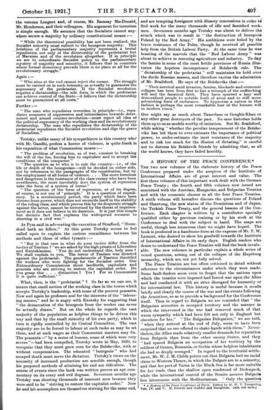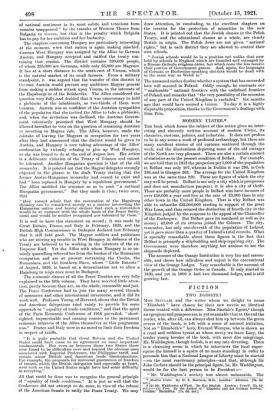A HISTORY OF THE PEACE CONFERENCE.* THE two new volumes
of the elaborate history of the Peace Conference prepared under the auspices of the Institute of International Affairs are of great interest and value. The first three volumes of this important work dealt with the German Peace Treaty ; the fourth and fifth volumes now issued are concerned with the Austrian, Hungarian, and Bulgarian Treaties and with the economic olauses in all the four _Peace Treaties.
A sixth volume will hereafter discuss the questions of Poland and Shantung, the new status of the Dominions and of Japan, the Turkish Peace Treaty, and the general lessons of the Con- ference. Each chapter is written by a contributor specially qualified either by previous training or by his work at the Conference to deal with the subject in hand. The maps are useful, though less numerous than we might have hoped. The book is produced in a handsome form at the expense of Mr. T. W. Lamont, who desired to show his goodwill towards the Institute of International Affairs in its early days. English readers who desire to understand the Peace Treaties will find the book invalu- able. The new volumes in particular explain a whole series of vexed questions, arising out of the collapse of the Hapsburg monarchy, which are not yet fully solved.
The Peace Treaties are too often criticized in detail without reference to the circumstances under which they were made. Some fault-finders seem even to forget that the nations upon which the treaties were imposed had forced war upon the Allies and had conducted it with an utter disregard for humanity or for international law. This history is useful because it recalls briefly and clearly the course of the war and the events following the Armistices, so as to provide a background for the Conference itself. Thus in regard to Bulgaria we are reminded that " the Bulgarian atrocities in occupied territory and the manner in which she intervened in the war had removed much of that warm sympathy which had been felt not only in England but elsewhere for her." " The Bulgarian Delegation," we are told, " when they arrived at the end of July, seem to have been surprised that no one offered to shake hands with them." Never- theless, the Allies made relatively smaller demands for reparation from Bulgaria than from the other enemy States, and they " had spared Bulgaria an occupation of her territory by the soldiers of Greece, Rumania, or Serbia whose helpless inhabitants she had so deeply wronged." In regard to the territorial settle- ment, Mr. W. J. M. Childs points out that Bulgaria had no racial claim to Western Thrace, in which the Bulgars aro in a minority, and that her port of Varna in the Black Sea is far more suitable for her trade. than the shallow open roadstead of Dedeagach, while the international control of the Straits assures Bulgaria
free intercourse with the Mediterranean. Only the question
• A Hillary of the Peace Conference of Parts. Edited by 11. W. V. Temperley. vol.. IV. and V.H. Frowde and Hodder and Stoughton. 14U net each-I of national sentiment in its most subtle and tenacious form remains unappeased " by the transfer of Western Thrace from Bulgaria to Greece, but that is the penalty which Bulgaria has to pay for her ambition and her barbarity.
The chapters concerning Hungary are particularly interesting at the moment, when that nation is again making mischief. German West Hungary was assigned by the Allies to German Austria, and Hungary accepted and ratified the treaty con- taining that cession. The district contains 330,000 people, of whom 235,000 are Germans, while only 25,000 are Magyars. It lies at a short distance to the south-east of Vienna, which is the natural market of its small farmers. From a military standpoint, it was argued that the transfer of this district to German Austria would prevent any ambitious Magyar general from making a sudden attack upon Vienna, in the interests of the Hapsburgs or of the Bolsheviks. The Allies considered the question very fully, and decided that it was unnecessary to hold a plebiscite of the inhabitants, as two-thirds of them were German. Austria was so confident of the Austrian sympathies of the population that she invited the Allies to take a plebiscite, and, when the invitation was declined, the Austrian Govern- ment voluntarily promised that West Hungary should be allowed hereafter to vote on the question of remaining Austrian or reverting to Magyar rule. The Allies, however, made the mistake of leaving the Magyars in occupation for two years after they had announced that the district would be given to Austria, and Hungary is now taking advantage of the Allies' moderation by virtually refusing to give up West Hungary, as she was bound to do at the end of August last. Her action is a deliberate violation of the Treaty of Trianon and cannot be tolerated. Another Hungarian question is that of the old monarchy. It is pointed out that the Magyar delegates strongly objected to the phrase in the draft Treaty stating that the former Austro-Hungarian monarchy had ceased to exist and had " been replaced in Hungary by a republican government." The Allies modified the sentence so as to read a national Hungarian government." But they made it clear, twice over, that
" they cannot admit that the restoration of the Hapsburg dynasty can be considered merely as a matter interesting the Hungarian nation and hereby declare that such a restoration would be at variance with the whole basis of the Peace Settle- ment and would be neither recognized nor tolerated by them."
It is well to have this statement on record ; it was made by Great Britain, France, and Italy in February, 1920, and the British High Commissioner in Budapest declared last February that it still held good. Tho Magyar soldiers and politicians who are stirring up trouble in West Hungary in defiance of the Treaty are believed to be working in the interests of the ex-
.. Emperor Karl. Yet the Allies with whom Hungary is so un- wisely quarrelling relieved her from the burden of the Rumanian occupation and are at present restraining the Czechs, the Rumanians, and the Southern Slays, whose " Little Entente" of August, 1920, is based on a determination not to allow a Hapsburg to reign once more in Budapest.
The economic clauses of all the Peace Treaties are very fully explained in the fifth volume. They have received little atten- tion, partly because they are, on the whole, reasonable and just. The Peace Conference had to join the many severed threads of commerce and other international intercourse, and it did its work well. Professor Young, of Harvard, shows that the British and American delegations tried vainly to provide for some approach to " equality of trade conditions," and that the spirit of the Paris Economic Conference of 1916 prevailed, " short- sighted, impracticable and running counter to the permanent economic interests of the Allies themselves as this programme was." France and Italy were in n.3 mood to limit their freedom in respect of tariffs.
" It is quite probable that Groat Britain and the United States could have come to an agreement on some important fundamentals. But even as between those two States there were found to be difficulties over and beyond the obvious ones associated with Imperial Preference, the Philippine tariff, and certain minor British and American trade discriminations. For example, the proposals for universal guarantees of freedom of transit, which the British delegation had especially at heart, were such as the United States might have had some difficulty in accepting."
All that could be done was to recognize the general principle of " equality of trade conditions." It is just as well that the Conference did not attempt to do more, in view of- the refusal of the American Senate to ratify the Peace Treaty. We may
draw attention, in concluding, to the excellent chapters on the treaties for the protection of minorities in the new States. It is pointed out that the Jewish clauses in the Polish Treaty, and the educational clauses as a whole, are clearly British in origin. The Polish Jews are not given " national rights," but in each district they are allowed to control their own schools.
" Jewish schools would be in a position not unlike that now held by schools in England which are founded and managed by a Roman Catholic religious order, but which none the less receive their portion of Government grants. And, again, the languages of German or Ruthenian-speaking districts would be dealt with in the same way as Welsh is."
The unnamed author doubts whether a system that has succeeded here will succeed in Poland. Oddly enough, ho contrasts our " unalterable " national frontiers with the undefined frontiers of Poland, and remarks that "the very possibility of the secession of any part of the United Kingdom is excluded." Six months ago that would have seemed a truism. To-day it is a highly disputable proposition, thanks to the Government's dealings with Sinn Fein.



































 Previous page
Previous page